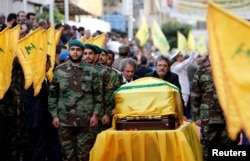The Lebanese militant group Hezbollah claims that Islamist extremists are responsible for the shelling death of its top military commander Mustafa Badreddine near Syria's Damascus airport Friday.
Hezbollah announced Badreddine's death Friday before holding a military funeral for the commander later on in the day.
In a statement released Saturday, the group said it launched an investigation and found that "the explosion which led to the martyrdom of commander Mustafa Badreddine was the result of artillery bombardment carried out by takfiri (Sunni extremist) groups in the area."
Hezbollah fighters carried the coffin of Badreddine through the streets of southern Beirut Friday in a funeral procession.
Badreddine, 55, led the Shi'ite group’s involvement in the Syrian civil war and was the highest official from the group to die since Hezbollah entered the conflict several years ago.
Badreddine was a top adviser of Hezbollah leader Sayyed Hassan Nasrallah.
The militant group has been fighting alongside troops loyal to Syrian President Bashar al-Assad.
Hezbollah said the war is necessary to protect Shi'ites from Sunni extremists who have been at the forefront of the Syrian opposition.
Hezbollah's deployment of fighters to Syria has increased the group's enemies beyond its traditional rival, Israel, to include Sunni extremists.
No information
The U.S. does not have information on who was behind the attack that killed Badreddine, State Department spokesman John Kirby said.
White House spokesman Josh Earnest said there were no U.S. or coalition aircraft in the area where Badreddine was reported to be killed.
Kirby noted that Badreddine was convicted in Kuwait for his role in bomb attacks on the U.S. and French embassies in 1983. Badreddine escaped from prison in Kuwait after the country was invaded by Iraq under the leadership of Saddam Hussein in 1990.
Badreddine was also one of four men accused in absentia of plotting the 2005 assassination of former Lebanese Prime Minister Rafik Hariri and 21 others. The trial began in 2014 at The Hague, Netherlands, and is ongoing. Hezbollah denied any involvement in the attack.
The U.S. Treasury Department imposed sanctions on Badreddine in 2011 and 2015 for his involvement in the Syrian war.
According to U.S. officials, Assad and Nasrallah coordinated Hezbollah's actions in Syria on a weekly basis, with Badreddine present at top Damascus meetings.
Announcing his death, Hezbollah said Badreddine would return from Syria victorious or "a martyr." The group released a picture showing a smiling Badreddine wearing a camouflage baseball cap.







